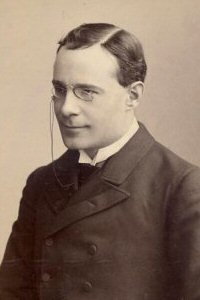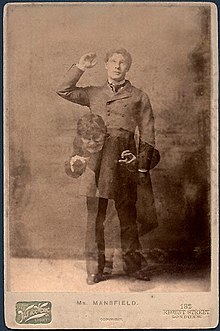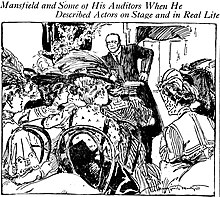Richard Mansfield

Richard Mansfield(24 May 1857 – 30 August 1907) was an Englishactor-managerbest known for his performances inShakespeareplays,Gilbert and Sullivanoperas, and the playDr. Jekyll and Mr. Hyde.
Life and career
[edit]Mansfield was born in Berlin and spent his early childhood onHeligoland,Germany, an island in the North Sea, then under British rule. His parents wereHermine Küchenmeister-Rudersdorf,a Russian-born operaticsoprano,and Maurice Mansfield, a British London-based wine merchant (died 1861). His grandfather was the violinist Joseph Rudersdorff.[1][2]Mansfield was educated atDerby School,in Derby, England, where he studied painting in London. His mother took him to America, where she was performing, but he returned to England at age 20. Finding that he could not make a living as a painter, he gained some success as a drawing-room entertainer, eventually moving into acting.[3]
Early career, D'Oyly Carte and first London successes
[edit]
He first appeared on the stage atSt. George's Hall, London,in theGerman Reed Entertainmentsand then turned to light opera, joiningRichard D'Oyly Carte's Comedy Opera Company in 1879 to appear as Sir Joseph Porter inH.M.S. Pinaforeon tour. He continued to play the Gilbert and Sullivan comic "patter" roles on tour in Britain until 1881. Mansfield created the role of Major General Stanley in the singlecopyright performanceofThe Pirates of PenzanceinPaignton,England, in 1879. In addition to Sir Joseph and the Major General, in 1880 he also began to play John Wellington Wells inThe Sorcerer.[3]
He left the D'Oyly Carte company in 1881, returned to London, and soon made his London debut inJacques Offenbach'sLa boulangère.He played several further roles in London and then travelled to America in 1882, where he made hisBroadwaydebut as Dromez inBucalossi'sLes Manteaux Noirswith a D'Oyly Carte touring company. He then played the roles of Nick Vedder and Jan Vedder in another D'Oyly Carte production,Robert Planquette'sRip Van Winkle(1882).[3]
Mansfield then appeared inBaltimore,Maryland, with another D'Oyly Carte troupe, as the Lord Chancellor in Gilbert and Sullivan'sIolanthein December 1882. He suffered a bad ankle sprain only two days later, however, and left the production, returning to New York. In 1883 he joinedA. M. Palmer's Union Square theatre company in New York, and made a hit as Baron Chevrial inA Parisian Romance.Mansfield's portrayal of Chevrial, a "realistic exhibition of depravity in dotage, by a young and comparatively unknown actor, was a surprise to the public, the managers, and the critics, and soon became a town topic."[1]He next played the role of Ko-Ko, the Lord High Executioner inThe Mikado,in Boston in early 1886, his last production with a D'Oyly Carte cast.[3]
He appeared successfully in an original play,Prince Karl,and in several plays adapted from well-known stories, and his 1887 rendering of the title-characters inThomas Russell Sullivan'sDr. Jekyll and Mr. Hydefor Palmer's company atMadison Square Theatre,only a year after publication ofRobert Louis Stevenson's novella, created a profound impression.[4]It was with this play that he made his London reputation during the 1888 season at theLyceum Theatre,by invitation ofHenry Irving.He also reprised the role in Broadway revivals.[5]
Actor-producer
[edit]
Mansfield continued his acting career but had also begun a career as a theatrical manager in America in 1886. He produced the playRichard IIIin 1889 at theGlobe Theatre.He was back on Broadway in 1890 inBeau Brummell(he reprised this role several times).[6]He was one of the earliest to produceGeorge Bernard Shaw's plays in America, appearing in 1894 as Bluntschli inArms and the Man,and as Dick Dudgeon inThe Devil's Disciplein 1897. The latter production was the first Shaw production to turn a profit. As a manager and producer of plays, Mansfield was known for his lavish staging. He often produced, starred in (often opposite his wife), and directed plays on Broadway, sometimes also writing under the pseudonymMeridan Phelps.His other Broadway roles in the 1890s includedNapoleon Bonaparte(1894), the title role inThe Story of Rodion, the Student(1895), Sir John Sombras inCastle Sombras(1896), Eugen Courvoisier inThe First Violin(1898 and 1988), the title role inCyrano de Bergerac(1898 and 1899).[5]
He began the new century on Broadway in the title role inKing Henry V(1900), followed by the title character inMonsieur Beaucaire,Brutus inJulius Caesar(1902), Karl Heinrich inOld Heidelberg(1903 and 1904), and roles inIvan the Terrible(1904),A Parisian Romance(1904 and 1905),The Merchant of Venice(1905),Richard III(1905), Alceste inThe Misanthrope(1905),The Scarlet Letter(1906) andDon Carlos(1906), among others. He continued to perform until his final year. One of his last performances, just a few months before his death, was the title role in a Broadway production ofHenrik Ibsen'sPeer Gynt,the play's U.S. premiere.[5]
Mansfield's popularity as a Shakespearean actor was immense. Upon his death,The New York Timesstated: "As an interpreter of Shakespeare, he had no living equal in his later days, as witnessed by the princely grace, the tragic force of his Richard, his thrilling acting in the tent scene of" Caesar ", the soldierly dignity and eloquence of his Prince Hal, and the pathos of the prayer in that play. He was the greatest actor of his hour, and one of the greatest of all times."[3]
Mansfield died inNew London, Connecticut,in 1907 at age 50, fromliver cancer.[5]
Suspected in Jack the Ripper case
[edit]
Mansfield was performing in the London production of theStrange Case of Dr Jekyll and Mr Hydein 1888 during the time thatJack the Ripperwas murdering women in London. One frightened theatre-goer wrote to the police accusing Mansfield of the murders because he could not believe that any actor could make so convincing a stage transformation from a gentleman into a mad killer without being homicidal. Mansfield attempted to gain public favour and stem the criticism that he was receiving by offering a performance of the comedyPrince Karlfor the benefit of theSuffragan Bishopof London's home and refuge fund for reformed prostitutes.[7]
Family life
[edit]Mansfield was married in 1892 toBeatrice Cameron(1868–1940),[8]an actress.[9]After their wedding, she was often referred to as Mrs Richard Mansfield by the press. In 1898 the couple had their only child, Richard Gibbs Mansfield (1898–1918). The younger Mansfield was an ambulance driver in France early duringWorld War I,eagerly enlisting while underage (with his mother's consent). When America entered the war, he joined the U.S. Army and went to Texas to be part of an aviation unit. There he contractedmeningitisand died in 1918.[10]After the war, Mansfield's wife worked with refugees from theArmenian genocidein Turkey and Palestine.[11]
Notes
[edit]- ^abTurney, Wayne S."Richard Mansfield"Archived5 April 2005 at theWayback Machine,A Glimpse of Theater History,accessed 20 May 2012
- ^"Erminia Rudersdorff (1822–1882)"Archived6 July 2008 at theWayback Machine,Picture History,accessed 24 June 2014; and Winter,pp. 349 et seq.
- ^abcdeStone, David."Richard Mansfield",Who Was Who in the D'Oyly Carte Opera Company,27 August 2001, 20 May 2012
- ^Dr. Jekyll and Mr. Hyde,IBDB, accessed 20 May 2012
- ^abcd"Meridan Phelps (Also known as Richard Mansfield)",accessed 20 May 2012
- ^Beau Brummell,IBDB, accessed 20 May 2012
- ^Morley, Christopher J.Jack the Ripper: A Suspect Guide(2005)
- ^Who's Who in New Englandby Albert Nelson Marquis, c. 1915, p. 719
- ^Beatrice CameronNYP Library
- ^"Richard Mansfield Dies in Texas Camp",The New York Times,5 April 1918, p. 15
- ^"Shakespeare in Lieu of Stew",New Near East,November 1920, pp. 23–24
References
[edit]- This article incorporates text from a publication now in thepublic domain:Chisholm, Hugh,ed. (1911). "Mansfield, Richard".Encyclopædia Britannica.Vol. 17 (11th ed.). Cambridge University Press. p. 600.
- Wilstach, Paul.Richard Mansfield: The Man and the Actor(New York, Scribner's, 1908)
- Winter, William.The Life and Art of Richard Mansfield,2 vols. (New York, Moffit, Yard & Co., 1910)
External links
[edit]- Richard Mansfieldphoto gallery at New York Public Library
- Richard Mansfield letters and ephemera, circa 1891,held by the Billy Rose Theatre Division,New York Public Library for the Performing Arts
- Richard Mansfield family papers, 1856–1940, bulk (1905–1940),held by the Manuscripts and Archives Division,New York Public Library
- 1857 births
- 1907 deaths
- 19th-century English male actors
- 20th-century English male actors
- People educated at Derby School
- English male stage actors
- English male Shakespearean actors
- Actor-managers
- Jack the Ripper
- Deaths from cancer in Connecticut
- Deaths from liver cancer in the United States
- Male actors from Berlin
- English people of Russian descent
